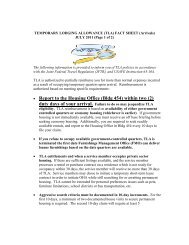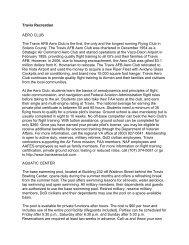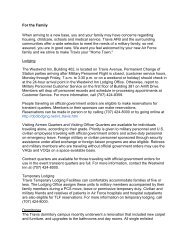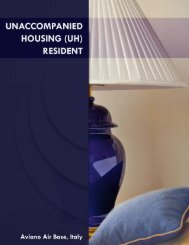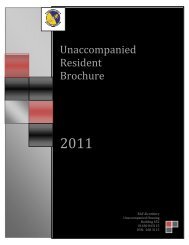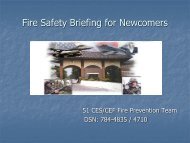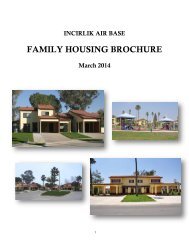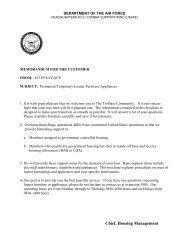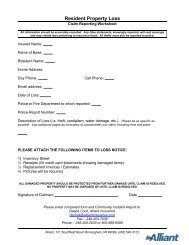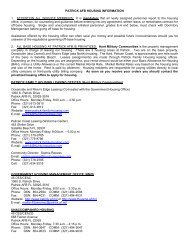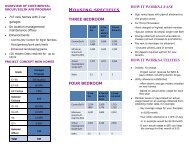San Antonio Military Telephone Directory - Air Force Housing
San Antonio Military Telephone Directory - Air Force Housing
San Antonio Military Telephone Directory - Air Force Housing
Create successful ePaper yourself
Turn your PDF publications into a flip-book with our unique Google optimized e-Paper software.
Randolph <strong>Air</strong> <strong>Force</strong> Base<br />
b. If equipment is tampered with, it will be removed from<br />
service immediately. Whoever willfully or maliciously<br />
damages or destroys any of the works of any radio,<br />
phone, cable station, system, or other means of communications<br />
operated or controlled by the USAF,<br />
whether constructed or in process of construction,<br />
or willfully or maliciously interferes in any way with<br />
the working or use of such line or systems shall be<br />
fined not more than $10,000 or imprisoned not more<br />
than 10 years or both. (Title 18, S 1362)<br />
2. EXcaVATING. Consult with Communications Cable<br />
Systems (902 CS/SCOW), 652-2881, prior to digging<br />
ditches, post holes, excavation or construction of any<br />
kind within the confines of Randolph AFB.<br />
3. CARE OF TELEPHONE EQUIPment. The telephone<br />
is a delicate instrument and needs proper treatment in<br />
order to provide reliable service.<br />
a. Apply only necessary pressure to the buttons of the<br />
telephone; don’t pound on the buttons.<br />
b. Don’t allow the handset cord to become twisted<br />
and knotted.<br />
c. Don’t alter, move, or affix devices to your telephone.<br />
Ask your TCO to submit an ITNS Remedy<br />
Requirement, whenever you need to relocate or alter<br />
telephone equipment. Make your request well in<br />
advance of the date by which you would like<br />
the equipment moved.<br />
d. Don’t attempt to fix your telephone. Call the<br />
HELP desk, 652-2015, opt. 1, for the telephone<br />
trouble desk.<br />
e. To release the buttons on a telephone key set after<br />
you hang up, use the HOLD button. Do not pound<br />
the telephone or partially depress other buttons.<br />
f. Don’t block telephone equipment cabinets, equipment<br />
cross-connect blocks or telephone terminals<br />
with desks, file cabinets and boxes of material,<br />
etc. A minimum 3-foot clearance is required in<br />
these areas.<br />
g. Don’t attempt to clean the telephone instruments<br />
using any “409” type spray cleaner. It will destroy<br />
integral parts of your telephone. If a phone needs<br />
cleaning, dampen a cloth with a mild cleaner and<br />
rub lightly until clean.<br />
h. Do not place your telephone on hold when you will<br />
be out of the office or don’t want to be disturbed.<br />
Doing this deprives another person of service and<br />
ties up Central Office equipment. If a phone is placed<br />
on hold for over 15 minutes, the telephone switch<br />
computer automatically disconnects that line and<br />
the user must call the HELP desk (652-2015,<br />
opt. 1) to have it reconnected. Repeated misuse<br />
of the HOLD feature can cause serious equipment<br />
damage, and you risk having your telephone<br />
removed. Call 652-7444 for features that offer<br />
alternatives to placing your line hold.<br />
4. use OF IMProPer LanGuaGE. The use of profane<br />
or obscene language over the telephone is prohibited by<br />
Federal and State statutes. It is a misdemeanor for anyone<br />
to use the telephone as a means of conveying obscene or<br />
indecent language or to make anonymous or repeated calls<br />
to annoy, abuse, embarrass or harass. It is the responsibility<br />
of all users to report any such activity to their security<br />
sections. Failure to observe the law will constitute cause<br />
for disconnecting telephone service.<br />
COMMUNICATIONS SEcurity (comSEC)<br />
Lax security concerning the telephone can range from<br />
leaving the telephone off hook, saying more than what is<br />
needed to be said, or attempting to “talk around” classified<br />
information.<br />
1. <strong>Telephone</strong>s are not secure. Classified information<br />
will not be discussed at any time during a telephone<br />
conversation.<br />
2. Personnel who make unauthorized disclosures of classified<br />
or sensitive official defense information during<br />
the use of the telephone are subject to disciplinary<br />
action. (Title 18 U.S. Code)<br />
3. Every telephone should have a DD Form 2056, Consent<br />
to <strong>Telephone</strong> Monitoring decal Telecommunication<br />
Monitoring Program. It warns people not to discuss<br />
classified information on the telephone, and also<br />
serves as legal authority for monitoring telephone<br />
conversations.<br />
4. Do not transmit classified information over unsecure<br />
telecommunications systems. All DoD tele-communication<br />
devices are subject to monitoring. Using DoD<br />
telecommunication systems constitutes consent to<br />
monitoring.<br />
5. For assistance with COMSEC issues, contact 902 CS/<br />
SCXS, C4 Systems Security, extension 652-2896.<br />
STE (SEcurE TELEphonE EQuipmEnt)<br />
To ensure the security of conversations involving classified<br />
information, use a Secure <strong>Telephone</strong> Equipment – Third<br />
Generation (STE). There are approximately 220 STEs<br />
on Randolph AFB. STEs are part of a worldwide network<br />
of encrypted secure voice communications for your<br />
organization, other DoD activities, and certain non-DoD<br />
offices. They can be used to discuss classified, sensitive<br />
but unclassified (SBU), or unclassified information. The<br />
use of STEs is controlled by access list, or letter from<br />
commanders or division chiefs, together with proof of<br />
security clearance and valid requirement. TDY personnel<br />
and others not on an access list but having a need to use<br />
the system must contact their sponsoring organization.<br />
REporting TELEphonE TROUBLE<br />
Report telephone trouble to the HELP desk, 652-2015,<br />
opt. 1. Before reporting a problem, make sure it is not<br />
due to someone leaving the receiver off the hook. Be<br />
prepared to give the following information when calling<br />
in a trouble report.<br />
• Building number<br />
• Room number<br />
• <strong>Telephone</strong> number (in trouble)<br />
• The nature of the trouble<br />
• Number where you can be reached<br />
1. Please don’t call someone else’s telephone trouble<br />
unless you are able to furnish all of this information.<br />
2. <strong>Telephone</strong> Systems technicians take trouble reports<br />
in the order in which they are reported. The average<br />
for closing trouble is no more than two days. Please<br />
refer to the Job Control Number (JCN) assigned to your<br />
trouble when checking on its status.<br />
3. UNAUTHORIZED RELocations. PLEASE! DO<br />
NOT attempt any do-it-yourself phone moving and<br />
then report the lines out of order. Ask your TCO to<br />
submit an ITNS Remedy Requirement, whenever<br />
you need to relocate telephone equipment. Make your<br />
request well in advance of the date by which you<br />
would like the equipment moved.<br />
4. PersonaL TELEPHONES. If you live on base<br />
and have telephone trouble, call the HELP desk,<br />
652-2015, opt. 1, before calling AT&T repair<br />
service. However, the technicians do not maintain<br />
personal instruments in base housing, only those<br />
that are government issue.<br />
5. After duty hours, report only mission essential<br />
troubles.<br />
6. Refer any questions about your telephone features,<br />
class of service, or repair service to the HELP desk,<br />
652-2015, opt. 1.<br />
REQUESTS FOR TELEphonE SErvicE<br />
1. OFFiciaL TELEPHone SERVice. Submit official<br />
requests for telephone service (installations, moves,<br />
special features, and equipment) on ITNS Remedy<br />
Requirement, through <strong>Telephone</strong> Control Officers<br />
to <strong>Telephone</strong> Survey (902 CS/SCOIS) 652-7444.<br />
<strong>Telephone</strong> service requests that are simple in nature<br />
and do not require the ordering of material are normally<br />
processed and completed within 30 working<br />
days, depending on the <strong>Telephone</strong> Systems Section’s<br />
workload. Requests requiring material must be submitted<br />
as far in advance as possible, as early as 6<br />
months in cases where material must be ordered from<br />
commercial companies, i.e., TIs, long-haul circuits,<br />
1-800 service, calling cards, Centrex and commercial<br />
business lines. Priority requests must be fully<br />
justified, stating why the request must be completed<br />
before other scheduled telephone work and signed by<br />
one of the following:<br />
a. Organizational Commander,<br />
b. Director, or<br />
c. Deputy Commander or Deputy Director.<br />
2. UNOFFiciaL COMMERCIAL TELEPHONE SERVice.<br />
a. <strong>Air</strong>man dormitory and base housing residents may<br />
obtain commercial (private) telephone service by<br />
contacting AT&T at (800) 464-7928 (toll-free).<br />
b. <strong>Housing</strong> residents with existing telephone service<br />
who wish to connect additional extensions<br />
should contact <strong>Telephone</strong> Survey (902 CS/SCOIS),<br />
652-7444. <strong>Telephone</strong> Systems will install the<br />
extension(s) at no expense to the resident.<br />
MINIMIZE<br />
MINIMIZE is a condition imposed by commanders to reduce<br />
the volume of electrical communications (both message<br />
and telephone traffic) during exercises or periods of emergency/crisis.<br />
It may be imposed DoD-wide, <strong>Air</strong> <strong>Force</strong>-wide,<br />
Command-wide, or for given countries, states, or areas as<br />
conditions warrant. During MINIMIZE conditions, vital and<br />
relevant electrical communications must not be delayed,<br />
and routine traffic must be drastically reduced.<br />
1. MINIMIZE applies to ALL DoD communications systems,<br />
including originators of card and tape traffic.<br />
2. When MINIMIZE is imposed, users of DoD electrical<br />
communications facilities must determine that:<br />
a. The information to be forwarded is required to avoid<br />
a seriously detrimental impact on mission accomplishment<br />
or safety of life.<br />
b. Electrical transmission is the only way to get information<br />
to the addressee in sufficient time to accomplish<br />
its purpose.<br />
2012/2013 Joint Base <strong>San</strong> <strong>Antonio</strong><br />
75




